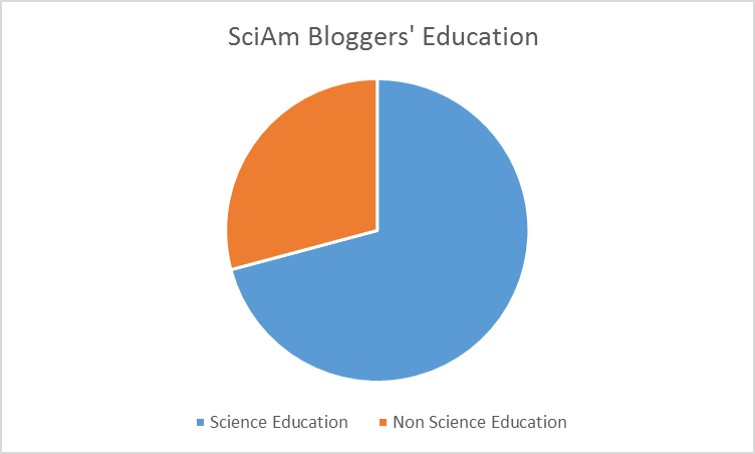Science Bloggers are Scientists? Not so fast...
As I'm reading through research literature on online science journalism and science blogs for my PhD research, I'm coming across quite a few papers that start from the assumption that science blogs are the production and activity of scientists. In this view, science blogs are the work of scientists "breaking out" of the 'ivory tower.' Many mass communication researchers in the past have approached science blogging from a particular angle: the science blog as a means for scientists to "circumvent the news media," telling their own stories of scientific research and beyond. But is this really what's happening in most science blog communities today? I think, in 2014, we are seeing science blogs augment science news media more than we are seeing them replace or circumvent it. And I think we are seeing more successful science blogs being written not necessarily by scientists writing about their own research (i.e. research blogging), but being written by science writers with dual, complex roles and training between science and communication.
In 2007, the science blog was described by two researchers in France as a “tool which enables scientists to speak directly to the people, allows people to read what scientists have to say, provides an opportunity for experts from different fields to exchange knowledge and enables wide-ranging dialogue between real people and the ‘ivory tower’” (Colson, 2011, p. 890; Lapointe & Drouin, 2007, p. 7). But, I think, the definition of a science blog is actually FAR more encompassing than that. Perhaps in 2007, early science blogs were more the sphere of scientists "breaking out." But today, I think the definition has changed drastically, especially as traditional science journalism has also increasingly become the purview of writers in the science blogosphere.
But out of an interest in this question, I took a look this morning at the roles and career positions of science bloggers at Scientific American and at SciLogs.com. I started with Scientific American Blogs, going through all of the general science blogs on the network (excluding Mind and Staff blogs). Between their biography statements on their blog pages and their LinkedIn profiles, I tried to figure out whether each science blogger on these two networks was 1) a working scientist (actively conducting scientific research), and/or 2) had a science education.
Before we move into the results of my little investigation, I should say that it was often VERY difficult to determine who was a working scientist and who wasn't. I counted current graduate researchers as scientists, as well as university professors and industry scientists (and even a self-professed "freelance geologist"). As I expected, though, many of the science bloggers at SciAm and SciLogs.com fill many and complex roles between science, education and communication. Many science bloggers are former PhD students or researchers who are now transitioning into other roles ("recovering scientists"), such as freelance writers and book authors. Many are researchers who have transitioned from research in the hard sciences to research in library science, communication science and many other areas of social science and science history. In other words, classifying the science blogger as a scientist or non-scientist is not as easy as it might seem. (Classifying the science blogger as "professional" science journalist or not is, I'm sure, equally as difficult.)
But in any case, here are the results for Scientific American blogs:
Note: By a "working scientist," I mean a current scientist who is actively conducting research in a university or industry setting. By labeling some bloggers "other" or not working scientists, I do NOT mean to say they aren't scientists in the broader sense. Once a scientist, always a scientist.
As you can see, a majority of Scientific American bloggers are in fact NOT working scientists. According to one blogger, "I set out to be a scientist, but like many science writers, realized in horror that I didn’t want to spend the rest of my life in a windowless lab staring at racks of Eppendorf tubes filled with clear liquids." Many SciAm bloggers are previous professors, previous science graduate students, and previous scientists in a variety of fields who have discovered they love to communicate science as much, or more, than they like to conduct it in a lab or in the field. Many other SciAm bloggers are former or current journalists, reporters and book authors who have ventured into the sciences. Many could almost be called self-taught scientists with formal training in journalism and communication.
But most SciAm bloggers DO have higher education in the "hard" sciences:
What about SciLogs.com bloggers? It turns out they also mostly have science educations, but many more SciLogs.com bloggers are current working scientists. Many SciLogs.com bloggers are graduate student researchers (current MSc and PhD students) as well as university professors:
These are only two different science blogging networks, but the science bloggers on each network vary significantly in their roles, fields and positions. Do bloggers who are active scientific researchers blog in different ways, or about different things, than bloggers who are not active scientific researchers? This is another good question that has not, to my knowledge, been answered yet. Research blogging by current scientific researchers obviously still plays an important role in the science blogosphere - perhaps in some science blog networks more than others. But the active scientist blogger is far from the primary "type" of science blogger.
What does it all mean?




